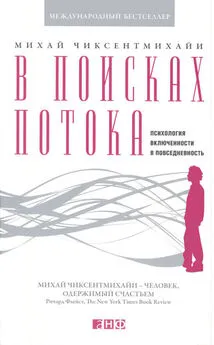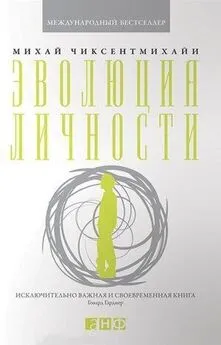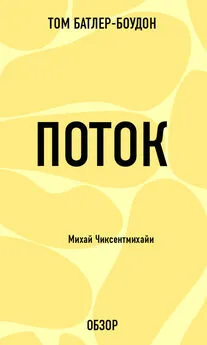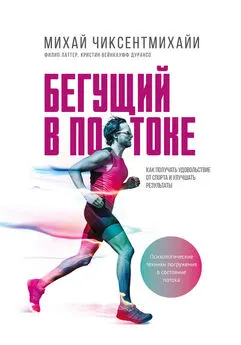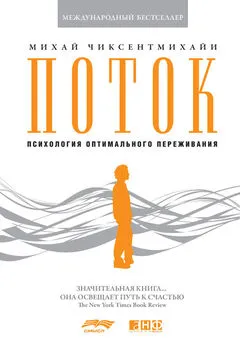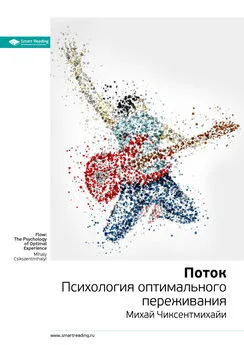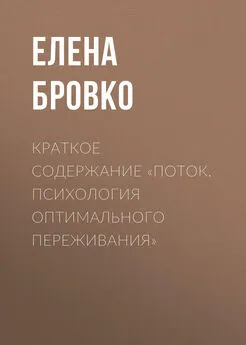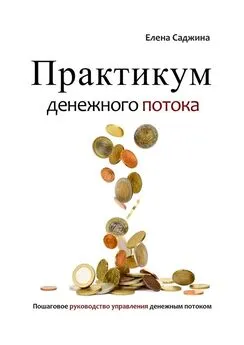Михай Чиксентмихайи - В поисках потока. Психология включенности в повседневность
- Название:В поисках потока. Психология включенности в повседневность
- Автор:
- Жанр:
- Издательство:Альпина нон-фикшн
- Год:2012
- ISBN:978-5-91671-172-1
- Рейтинг:
- Избранное:Добавить в избранное
-
Отзывы:
-
Ваша оценка:
Михай Чиксентмихайи - В поисках потока. Психология включенности в повседневность краткое содержание
В поисках потока. Психология включенности в повседневность - читать онлайн бесплатно ознакомительный отрывок
Интервал:
Закладка:
Larson, R., and M. Csikszentmihalyi. 1978. Experiential correlates of solitude in adolescence. Journal of Personality 46, no. 4:677–93.
Larson, R., and M. H. Richards. 1994. Divergent realities: The emotional lives of mothers, fathers, and adolescents. New York: Basic Books.
Larson, R., R. Mannell, and J. Zuzanek. 1986. Daily well-being of older adults with family and friends. Psychology and Aging 12:117–26.
Lash, C. 1990. The true and only heaven: Progress and its critics. New York: Norton.
Le Roy Ladurie, E. 1979. Montaillou. New York: Vintage.
Lebra, T. S. 1976. Japanese patterns of behavior. Honolulu: University of Hawaii Press. Lee, R. B., and I. DeVore, eds. 1968. Man the hunter. Chicago: Aldine.
Lerner, R. M. 1984. On the nature of human plasticity. New York: Cambridge University Press.
Lewinsohn, P. M. 1982. Behavioral therapy: Clinical applications. In Short-term therapies for depression , edited by A. J. Rush. New York: Guilford.
Loubris, S., F. Crous, and J. M. Schepers. 1995. Management by objectives in relation to optimal experience in the workplace. Journal of Industrial Psychology 21, no. 2:12–17.
Lykken, D., and A. Tellegen. 1996. Happiness is a stochastic phenomenon. Psychological Science 7, no. 3:186–9.
Macbeth, J. 1988. Ocean cruising. In Optimal experience: Psychological studies of flow in consciousness , edited by M. Csikszentmihalyi and I. S. Csikszentmihalyi. New York: Cambridge University Press, pp. 214–31.
Marcuse, H. 1955. Eros and civilisation. Boston: Beacon.
Markus, H. R., and S. Kitayama. 1991. Culture and self: Implications for cognition, emotion, and motivation. Psychological Review 98, no. 2:224–53.
Marriott, M. 1976. Hindu transactions: Diversity without dualism. In Transaction and meaning: Directions in the anthropology of exchange and symbolic behavior , edited by B. Kepferer. Philadelphia: ISHI Publications.
Maslow, A. 1971. The farther reaches of human nature. New York: Viking.
Massimini, F., and M. Carli. 1988. The systematic assessment of flow in daily experience. In Optimal experience: Psychological studies of flow in consciousness, edited by M. Csikszentmihalyi and I. S. Csikszentmihalyi. New York: Cambridge University Press, pp. 266–87.
Massimini, F., and A. Delle Fave. 1991. Religion and cultural evolution. Zygon 16, no. 1:27–48.
Massimini, F., and P. Inghilleri, eds. 1986. L’esperienza quotidiana: Teoria e metodi d’analisi. Milan: Franco Angeli.
McQuillan, J., and G. Conde. 1996. The conditions of flow in reading: Two studies of optimal experience. Reading Psychology 17:109–35.
Mitterauer, M., and R. Sieder. 1982. The European family. Chicago: University of Chicago Press.
Moneta, G. B., and M. Csikszentmihalyi. 1996. The effect of perceived challenges and skills on the quality of subjective experience. Journal of Personality 64, no. 2:275–310.
Myers, D. G. 1992. The Pursuit of Happiness. New York: Morrow.
Myers, D. G, and E. Diener. 1995. Who is happy? Psychological Science 6:10–19.
Negri, P., F. Massimini, and A. Delle Fave. 1992. Tema di vita e strategie adattive nei non vedenti. In Vedere con la mente , edited by D. Galati. Milan, Italy: Franco Angeli.
Nietzsche, F. [1882] 1974. The gay science. New York: Vintage.
Noelle-Neumann, E. 1995. AWA Spring Survey. Allensbach Institute fur Demoskopie.
-----. 1996. Stationen der Glücksforschung. In Leseglück: Eine vergessene Erfahrung? , edited by A. Bellebaum and L. Muth. Opladen: Westdeutscher Verlag, pp. 15–56.
Noelle-Neumann, E., and R. Kocher, eds. 1993. Allensbacher Jahrbuch der Demoskopie 1984–1992. Munich, Germany: K.G. Saur.
Noelle-Neumann, E., and B. Strumpel. 1984. Macht Arbeit Krank? Macht Arbeit glüchlkh? Munich: Pieper Verlag.
Norberg, K. 1993. Prostitutes. In A history of women in the West , edited by N. Zemon Davis and A. Farge. Cambridge, Mass.: Harvard University Press, pp. 458–74.
Perry, S. K. 1996. When time stops: How creative writers experience entry into the flow state. Ph.D. diss., The Fielding Institute.
Pirsig, R. 1977. Cruising blues and their cure. Esquire 87, no. 5:65–8. Psychiatry, Group for the Advancement of. 1958. The psychiatrists’ interest in lesure-time activities , no. 39.
Rathunde, K. In press. Family context and talented adolescents’ optimal experience in productive activities. Journal of research in adolescence.
Reigberg, D. 1995. Glück in Garten — Erfolg im Markt. Offenburg, Germany: Senator Verlag.
Riesman, D., N. Glazer, and R. Denney. 1950. The lonely crowd. New York: Doubleday.
Rogers, C. 1969. Freedom to learn. Columbus, Ohio: Charles Merrill.
Sahlins, M. D. 1972. Stone Age economics. Chicago: Aldine Press.
Schmidt, J. 1997. Workers and players: Exploring involvement levels and experience of adolescents in work and play. Meetings of the American Educational Research Association. Boston, Mass.
Selye, H. 1956. The stress of life. New York: McGraw-Hill.
Singer, I. 1966. The nature of love. 3 vols. Chicago: University of Chicago Press.
Singer, J. L. 1966. Daydreaming: An introduction to the experimental study of inner experience. New York: Random House.
-----. 1981. Daydreaming and fantasy. Oxford, UK: Oxford University Press.
Stein, G. L., J. C. Kimiecik, J. Daniels, and S. A. Jackson, 1995. Psychological antecedents of flow in recreational sports. Personality and social psychology bulletin 21, no. 2:125–35.
Szalai, A., ed. 1965. The use of time: Daily activities of urban and suburban populations in twelve countries. Paris: Mouton.
Teilhard de Chardin, P. 1965. The phenomenon of man. New York: Harper and Row. Terkel, S. 1974. Working. New York: Pantheon.
Thompson, E. P. 1963. The making of the English working class. New York: Viking.
Trevino L.K., and J. W. Trevino. 1992. Flow in computer-mediated communication. Communication Research 19, no. 5:539–73.
Veyne, P. 1987. The Roman Empire. In From Pagan Rome to Byzantium , edited by P. Veyne. Cambridge, Mass: The Belknap Press, pp. 5–230.
Webster, J., and J. J. Martocchio. 1993. Turning work into play: Implications for microcomputer software training. Journal of Managements , no. 1:127–46.
Wells, A. 1988. Self-esteem and optimal experience. In Optimal Experience: Psychological studies of flow in consciousness , edited by M. Csikszentmihalyi and I. S. Csikszentmihalyi. New York: Cambridge University Press, pp. 327–41.
Williams, G. C. 1988. Huxley’s «Evolution and ethics» in sociobiological perspective. Zygon 23, no. 4:383–407.
Yankelovich, D. 1981. New rules in American life: Searching for self-fulfillment in a world turned upside-down. Psychology Today 15, no. 4:35–91.
Сноски
1
Утверждение Паскаля о том, что, хотя существование бога недоказуемо, все равно следует вести себя так, будто он есть: если его нет — ты ничего не потеряешь, а если есть — обретешь спасение. — Прим. пер.
Интервал:
Закладка:
